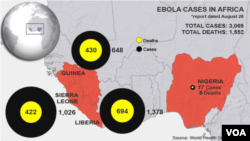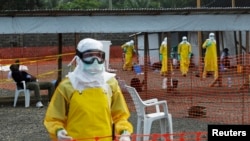The World Health Organization is launching a so-called roadmap aimed at bringing the largest Ebola outbreak in history under control. WHO warns it could take up to nine months, cost nearly a half-billion dollars, and cause thousands of deaths before the epidemic raging in West Africa ends.
The World Health Organization reports the Ebola outbreak in four West African countries is spreading rapidly. The ministries of health in Guinea, Liberia, Nigeria and Sierra Leone report more than 3,000 confirmed cases of the disease, with 1,552 deaths. WHO says the actual number of cases may be two to four times higher.
It says nearly 40 percent of the reported cases have occurred within the past three weeks.
Given the intensity and acceleration of the disease, WHO warns the number of cases could exceed 20,000 over the next six months.
WHO Assistant Director-General Bruce Ayleward says the outbreak of Ebola in West Africa is unlike any ever seen. He says Ebola is not located in a single, remote forested area. It is occurring in multiple hot spots within the affected countries, making it very difficult to contain the disease.
Ayleward says WHO's new action plan calls for a dramatic scale-up of treatment and management centers and emphasizes the need for safe burials.
He says 750 international staff and 12,000 nationals working closely with people in Ebola-infected communities are needed to make the plan work.
"You cannot beat Ebola without the people involved. This is not light talk," he said. "This is as essential as what WHO does, what the U.N. does, what MSF does, etc. We need that local leadership because so many of the problems are rooted in fear, as you know. So much of it is rooted in misunderstanding. We need the people that they trust understanding the disease, understanding the messages, understanding the strategies, and especially understanding how to be safe."
Financing
The operation is very big and expensive. It will cost $489 million over the next six months. Dr. Ayleward says that figure is based on the assumption that airplanes that have suspended flights to Ebola-affected countries will, once again, fly to these places.
He says WHO currently is budgeting for a short-term air bridge to fly in essential staff and supplies. However, he warns the operation costs will spiral upward if the air-bridge has to operate on a long-term basis.
Closing borders, a 'self-defeating strategy'
Ayleward tells VOA there needs to be global preparedness given the potential for international spread of the virus, and that means there has to be preparedness in major transport hubs.
"Bans on travel and trade and the rest will not stop this virus, absolutely not. In fact, you are more likely to compromise the ability to respond, to get more and more disease, more and more people trying to move," he said. "You are going to get yourself into trouble. It is a self-defeating strategy to ban travel. That is not the problem. People with Ebola are symptomatic. You can actually exit screen, put strong screening in place and then be able to substantively reduce that risk."
The WHO roadmap will be complemented by the development of a separate U.N.-wide operation using the skills and capacities of other agencies, including logistics and transportation. That operation will deliver essential services, such as food, water and sanitation, and primary health care.
Nigeria, DRC
Earlier Thursday, Nigeria's Health Ministry reported two more cases of Ebola, bringing the country's total to 15.
Officials said Thursday that a man working for the Economic Community of West African States recovered from an Ebola infection without treatment, but that his doctor died last week from the virus.
Six people have now died from Ebola in Nigeria during the latest outbreak.
The WHO said Wednesday that 80 people are also being monitored for Ebola in the Democratic Republic of Congo in an outbreak that is not related to the one in West Africa.
USAID funding
Meanwhile, the U.S. Agency for International Development is providing an additional $5 million to fight the Ebola outbreak in West Africa.
The new funding will be used for health equipment, training of health care workers and support of public outreach campaigns.
USAID has now committed nearly $20 million to combat Ebola since the outbreak was first reported in March.
A shortage of protective equipment is one of the factors contributing to the epidemic.
Potential Ebola vaccine set for human trials
Safety tests for an experimental Ebola vaccine are being fast-tracked, meaning trials on humans could start in weeks.
British drug company GlaxoSmithKline said Thursday the vaccine is expected to be given to healthy volunteers in Britain and the United States in mid-September and then to people in Gambia and Mali.
GlaxoSmithKline is working with the U.S. National Institutes of Health to develop the vaccine with British-based medical charity Wellcome Trust helping to fund the vaccine trials.
GlaxoSmithKline says the vaccine would guard against the Zaire strain of Ebola, which is circulating in West Africa.
The company said it plans to begin making up to 10,000 doses of the vaccine at the same time as the clinical trials, to make the vaccine immediately available if successful.






